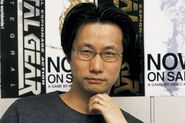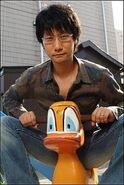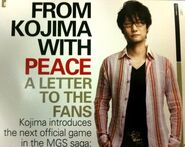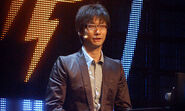Tag: Visual edit |
(→Gallery: Added details to 2 pictures; Kojima with duck and Kojima with Erick Bossick.) Tags: Visual edit apiedit |
||
| (37 intermediate revisions by 11 users not shown) | |||
| Line 1: | Line 1: | ||
{{Person Infobox |
{{Person Infobox |
||
|name = {{nihongo|'''Hideo Kojima'''|小島 秀夫}} |
|name = {{nihongo|'''Hideo Kojima'''|小島 秀夫}} |
||
| − | |image = [[File: |
+ | |image = [[File:Metal gear Hideo (2).jpg|250px|Hideo Kojima at Japan Expo 2010 in Paris, France]] |
| − | |birth date = August 24, 1963 (age |
+ | |birth date = August 24, 1963 (age 51) |
|birth place = Setagaya, Tokyo, Japan |
|birth place = Setagaya, Tokyo, Japan |
||
|occupation = Video game designer |
|occupation = Video game designer |
||
| − | |website = [http://www.blog.konami.jp/gs/hideoblog/ |
+ | |website = [https://web.archive.org/web/20071204063609/http://www.blog.konami.jp/gs/hideoblog/ Hideo Kojima's Blog] (Japanese) |
}} |
}} |
||
| Line 12: | Line 12: | ||
Kojima is consistently named by fans and industry experts alike as being one of the most influential and innovative video game directors and writers of all time, as well as being on many all time director top ten lists. ''Newsweek'' named Kojima as one of the top ten people of 2002.<ref>{{cite web |url=http://www.konami.co.jp/en/news/topics/011226/index-e.html |title=Mr. Kojima, Konami Videogame Designer Was Selected One Of Ten "Who's Next?" of NEWSWEEK |date=2002-01-22 |accessdate=2008-03-31}}</ref> In 2008, Next-Gen placed him #7 in their list of "Hot 100 Developer 2008."<ref>{{cite web |url=http://archive.is/oTORe|title=THE NEXT-GEN HOT 100 DEVELOPERS 2008 |accessdate=2014-03-17|date=2008-02-19}}</ref> |
Kojima is consistently named by fans and industry experts alike as being one of the most influential and innovative video game directors and writers of all time, as well as being on many all time director top ten lists. ''Newsweek'' named Kojima as one of the top ten people of 2002.<ref>{{cite web |url=http://www.konami.co.jp/en/news/topics/011226/index-e.html |title=Mr. Kojima, Konami Videogame Designer Was Selected One Of Ten "Who's Next?" of NEWSWEEK |date=2002-01-22 |accessdate=2008-03-31}}</ref> In 2008, Next-Gen placed him #7 in their list of "Hot 100 Developer 2008."<ref>{{cite web |url=http://archive.is/oTORe|title=THE NEXT-GEN HOT 100 DEVELOPERS 2008 |accessdate=2014-03-17|date=2008-02-19}}</ref> |
||
| − | + | Kojima's ''Metal Gear'' series contains elements of [[Wikipedia:Magic realism|magic realism]] and often breaks the [[fourth wall]]. He is also well known for a quirky and somewhat irreverent sense of humor, and his frequently disarming and powerful plot twists. |
|
== Early life == |
== Early life == |
||
| + | [[File:KojimaCollege--article image - Copy.jpg|thumb|right|Kojima in 1983.]] |
||
Born in Setagaya, Tokyo in 1963,<ref name="ign_bio" /> Kojima moved to western Japan at the age of three. Kojima has said that early on in his life he often had to deal with death. |
Born in Setagaya, Tokyo in 1963,<ref name="ign_bio" /> Kojima moved to western Japan at the age of three. Kojima has said that early on in his life he often had to deal with death. |
||
| − | When he was little the Kojima family moved to a small city called |
+ | When he was little the Kojima family moved to a small city called Shirasaki. Just as quickly, his family soon moved to the Kansai region. Kojima has noted that growing up he was a latchkey kid, often having to watch television and look after himself when he came home from school. Staying at home by himself in isolation still affects him to this day stating, "[whenever] I travel and stay at a hotel I put the TV on as soon as I enter the room, just to deal with the feeling of loneliness." |
Initially wanting to be an artist or illustrator, he was often discouraged by societal norms of Japan which favored finding safe and well paying jobs. He was also discouraged because his uncle was also an artist but suffered from financial difficulties. |
Initially wanting to be an artist or illustrator, he was often discouraged by societal norms of Japan which favored finding safe and well paying jobs. He was also discouraged because his uncle was also an artist but suffered from financial difficulties. |
||
| Line 36: | Line 37: | ||
In 1990, Kojima released ''[[Metal Gear 2: Solid Snake]]'' for the MSX2 in Japan only. The game was critically acclaimed in Japan for its sophisticated gameplay and intricate storyline, as it introduced many significant changes and additions to the ''Metal Gear'' series, most of which were later carried over to ''[[Metal Gear Solid]]''. Of particular importance was the significantly improved characterization of the game's cast and the bigger emphasis given to the game's storyline, which was advanced through the use of cutscenes and covered themes regarding the effects of war. Other changes include significant enhancements to the enemy soldiers' behavior and AI, the ability to crawl, and the introduction of the radar, among other improvements. Despite the game's success in Japan, it was never officially released in the West until its inclusion in ''[[Metal Gear Solid 3: Subsistence]]'' in 2006. |
In 1990, Kojima released ''[[Metal Gear 2: Solid Snake]]'' for the MSX2 in Japan only. The game was critically acclaimed in Japan for its sophisticated gameplay and intricate storyline, as it introduced many significant changes and additions to the ''Metal Gear'' series, most of which were later carried over to ''[[Metal Gear Solid]]''. Of particular importance was the significantly improved characterization of the game's cast and the bigger emphasis given to the game's storyline, which was advanced through the use of cutscenes and covered themes regarding the effects of war. Other changes include significant enhancements to the enemy soldiers' behavior and AI, the ability to crawl, and the introduction of the radar, among other improvements. Despite the game's success in Japan, it was never officially released in the West until its inclusion in ''[[Metal Gear Solid 3: Subsistence]]'' in 2006. |
||
| − | In 1992 Kojima remade ''Snatcher'' for the PC under title of ''Snatcher CD-ROMantic'' which would then be ported to the Sega CD, the game's only official English version. In 1994 he designed ''Policenauts'', a film noir/sci-fi-themed adventure game set in a space colony often regarded as a "spiritual sequel" to ''Snatcher.'' ''Snatcher'' and ''Policenauts'' were both huge successes in Japan. Kojima regards ''Policenauts'' as his "most exhaustive piece of work." He often calls ''Metal Gear'' a "blockbuster movie series" while he regards ''Policenauts'' as his "independent film." |
+ | In 1992, Kojima remade ''Snatcher'' for the PC under title of ''Snatcher CD-ROMantic'' which would then be ported to the Sega CD, the game's only official English version. In 1994 he designed ''Policenauts'', a film noir/sci-fi-themed adventure game set in a space colony often regarded as a "spiritual sequel" to ''Snatcher.'' ''Snatcher'' and ''Policenauts'' were both huge successes in Japan. Kojima regards ''Policenauts'' as his "most exhaustive piece of work." He often calls ''Metal Gear'' a "blockbuster movie series" while he regards ''Policenauts'' as his "independent film." |
With the release of ''Metal Gear Solid'' in 1998 for the [[PlayStation]], Kojima became an international celebrity among gamers. ''Metal Gear Solid'' was the first in the ''Metal Gear'' series to use 3D graphics and voice acting, which gave a more cinematic experience to the game. ''Metal Gear Solid'' was highly regarded for its well-designed gameplay and for its characters and storyline, which featured themes of nuclear proliferation and genetic engineering and is widely considered to be one of the best PlayStation games. |
With the release of ''Metal Gear Solid'' in 1998 for the [[PlayStation]], Kojima became an international celebrity among gamers. ''Metal Gear Solid'' was the first in the ''Metal Gear'' series to use 3D graphics and voice acting, which gave a more cinematic experience to the game. ''Metal Gear Solid'' was highly regarded for its well-designed gameplay and for its characters and storyline, which featured themes of nuclear proliferation and genetic engineering and is widely considered to be one of the best PlayStation games. |
||
| Line 51: | Line 52: | ||
Also released was ''[[Metal Gear Acid]]'', a new spin on the ''Metal Gear'' series, for the [[PlayStation Portable]] in 2004 in Japan and 2005 in other countries. Its sequel ''[[Metal Gear Acid 2]]'' was released in 2005 in Japan and 2006 in other countries. |
Also released was ''[[Metal Gear Acid]]'', a new spin on the ''Metal Gear'' series, for the [[PlayStation Portable]] in 2004 in Japan and 2005 in other countries. Its sequel ''[[Metal Gear Acid 2]]'' was released in 2005 in Japan and 2006 in other countries. |
||
| − | ''[[Metal Gear Solid: Portable Ops]]'' was also released in 2006. It takes places six years after the events of '' |
+ | ''[[Metal Gear Solid: Portable Ops]]'' was also released in 2006. It takes places six years after the events of ''Metal Gear Solid 3''. Kojima was the producer and general manager for the game. |
Kojima wanted Solid Snake to appear in ''[[w:c:super-smash-bros:Super Smash Bros. Melee|Super Smash Bros. Melee]]'', but due to development cycle problems Nintendo was unable to add Snake in. When ''[[Super Smash Bros. Brawl]]'' was announced, series producer Masahiro Sakurai contacted Kojima to work Snake into the game. Kojima also worked on Snake's stage for ''Super Smash Bros. Brawl''.<ref>{{cite web |url=http://www.joystiq.com/2006/05/10/super-smash-bros-brawl-revealed-for-wii-featuring-solid-snake/ |title=Super Smash Bros. Brawl revealed for Wii, featuring Solid Snake! |date=2006-05-10 |accessdate=2008-03-13}}</ref> |
Kojima wanted Solid Snake to appear in ''[[w:c:super-smash-bros:Super Smash Bros. Melee|Super Smash Bros. Melee]]'', but due to development cycle problems Nintendo was unable to add Snake in. When ''[[Super Smash Bros. Brawl]]'' was announced, series producer Masahiro Sakurai contacted Kojima to work Snake into the game. Kojima also worked on Snake's stage for ''Super Smash Bros. Brawl''.<ref>{{cite web |url=http://www.joystiq.com/2006/05/10/super-smash-bros-brawl-revealed-for-wii-featuring-solid-snake/ |title=Super Smash Bros. Brawl revealed for Wii, featuring Solid Snake! |date=2006-05-10 |accessdate=2008-03-13}}</ref> |
||
| Line 57: | Line 58: | ||
[[File:Hideo Kojima Bomb Shelter.jpg|right|200px|thumbnail|Kojima makes a cameo appearance in one of ''Metal Gear Solid 4''<nowiki></nowiki>'s opening movies. He's watching from the sidelines.]] |
[[File:Hideo Kojima Bomb Shelter.jpg|right|200px|thumbnail|Kojima makes a cameo appearance in one of ''Metal Gear Solid 4''<nowiki></nowiki>'s opening movies. He's watching from the sidelines.]] |
||
| − | Kojima |
+ | Kojima co-directed ''[[Metal Gear Solid 4: Guns of the Patriots]]'' with [[Shuyo Murata]], as well as co-producing and co-writing the game. Kojima also oversaw the entirety of the games production, including the opening movies which were created by Logan, as well as making a cameo appearance in one of them. In addition, he is credited as the "Voice of God" in the game's voice over credits; during the scene in which [[Psycho Mantis]]' ghost convulses then disappears, the player can hear Kojima's voice yell, "Silence!", accompanied by an image of Kojima himself via a hidden flashback. |
Following ''Metal Gear Solid 4'', Kojima announced three new games in the ''Metal Gear'' series at E3 2009. The first game announced was ''[[Metal Gear Rising: Revengeance|Metal Gear Solid: Rising]]'', a multiplatform game starring Raiden that was supposed to take place between ''Metal Gear Solid 2'' and ''Metal Gear Solid 4''. ''Rising'' was later retitled ''[[Metal Gear Rising: Revengeance]]'' and developed by [[wikipedia:Platinum Games|Platinum Games]]. It takes place four years after the events of ''Metal Gear Solid 4''. The second game announced, ''[[Metal Gear Solid: Peace Walker]]'', is set 10 years after the events of ''Metal Gear Solid 3'' and stars [[Big Boss]]. ''Peace Walker'' was released in 2010. The final game announced, ''[[Metal Gear Arcade]]'', is a coin-op iteration of ''[[Metal Gear Online]]''. It was also released in 2010. He was also involved in |
Following ''Metal Gear Solid 4'', Kojima announced three new games in the ''Metal Gear'' series at E3 2009. The first game announced was ''[[Metal Gear Rising: Revengeance|Metal Gear Solid: Rising]]'', a multiplatform game starring Raiden that was supposed to take place between ''Metal Gear Solid 2'' and ''Metal Gear Solid 4''. ''Rising'' was later retitled ''[[Metal Gear Rising: Revengeance]]'' and developed by [[wikipedia:Platinum Games|Platinum Games]]. It takes place four years after the events of ''Metal Gear Solid 4''. The second game announced, ''[[Metal Gear Solid: Peace Walker]]'', is set 10 years after the events of ''Metal Gear Solid 3'' and stars [[Big Boss]]. ''Peace Walker'' was released in 2010. The final game announced, ''[[Metal Gear Arcade]]'', is a coin-op iteration of ''[[Metal Gear Online]]''. It was also released in 2010. He was also involved in |
||
| Line 65: | Line 66: | ||
===2010s=== |
===2010s=== |
||
| − | On June 20, 2012, Kojima |
+ | On June 20, 2012, Kojima officially announced that ''Metal Gear Solid V'' was in development and that it would use the Fox Engine. In a Twitter post made Kojima, he revealed that he became a scholar at the University of Southern California. During a lecture hosted by him, he unveiled a new demo of the Fox Engine depicting a man similar to Big Boss and a Stryker in a jungle environment. Regarding the 25th anniversary, he stated that he'd make an announcement relating to the 25th anniversary and his new project on August 30, 2012.<ref>http://www.eurogamer.net/articles/2012-07-11-metal-gear-solid-4-patch-to-add-trophies</ref> |
| + | |||
| + | Kojima appears as a [[Militaires Sans Frontières]] [[Hideo|informant]] in ''[[Metal Gear Solid V: Ground Zeroes]]'', during the Side Op [[Intel Operative Rescue]], which he voices in both the Japanese and English versions of the game. |
||
| + | |||
| + | Kojima has stated that he suffers from 3D Motion Sickness, which is why he could not add new camera angles to ''Metal Gear Solid 3''. |
||
== Last ''Metal Gear'' game == |
== Last ''Metal Gear'' game == |
||
| − | Kojima has stated multiple times |
+ | Kojima has stated multiple times when the latest ''Metal Gear'' game was released that it would be the last in the series.<ref name="Final game">[http://kotaku.com/a-list-of-times-hideo-kojima-has-said-hes-done-making-m-1689707939 A List Of Times Hideo Kojima Has Said He's Done Making Metal Gear]</ref> He has stated this after the releases of: ''Metal Gear Solid'', ''Metal Gear Solid 2: Sons of Liberty'', ''Metal Gear Solid 3: Snake Eater'' and ''Metal Gear Solid 4: Guns of the Patriots'', saying that ''Metal Gear Solid 4'' "is going to the final one for me."<ref name="Final game"/> He said that ending the ''Metal Gear'' series would give him more freedom to pursue other projects in the future and also stated that ''Metal Gear Solid 4'' would be the final game to feature Solid Snake.<ref name="Final game"/> However, with the announcement of ''Metal Gear Rising'', ''Peace Walker'', and ''Metal Gear Solid V'', Kojima is once again involved in the ''Metal Gear'' series. |
| − | == |
+ | ==Future of ''Metal Gear'' == |
Regarding the ''Metal Gear'' series, Kojima stated at the 2009 Tokyo Game Show: |
Regarding the ''Metal Gear'' series, Kojima stated at the 2009 Tokyo Game Show: |
||
| Line 78: | Line 83: | ||
When asked about remaking the original ''Metal Gear'' in September 2009, Kojima stated that he was at the time too busy to do it. However, he said that he does not have to be the one to remake it and suggested somebody younger or even a foreign studio unassociated with Kojima Productions could develop it.<ref>[http://kotaku.com/5370315/kojima-maybe-a-foreign-studio-should-re+make-metal-gear Kojima: Maybe A Foreign Studio Should Re-Make Metal Gear]. Kotaku. 2009-09-29. Accessed 2009-10-22.</ref> |
When asked about remaking the original ''Metal Gear'' in September 2009, Kojima stated that he was at the time too busy to do it. However, he said that he does not have to be the one to remake it and suggested somebody younger or even a foreign studio unassociated with Kojima Productions could develop it.<ref>[http://kotaku.com/5370315/kojima-maybe-a-foreign-studio-should-re+make-metal-gear Kojima: Maybe A Foreign Studio Should Re-Make Metal Gear]. Kotaku. 2009-09-29. Accessed 2009-10-22.</ref> |
||
| − | He has stated during the development of both comprising parts of ''Metal Gear Solid V'' that he intends to follow through with his supposed retirement from the series. |
+ | He has stated during the development of both comprising parts of ''Metal Gear Solid V'' that he intends to follow through with his supposed retirement from the series.<ref>[http://www.ign.com/articles/2015/03/04/kojima-says-metal-gear-solid-v-the-phantom-pain-is-the-last-metal-gear-solid Kojima Says Metal Gear Solid V: The Phantom Pain Is the Last 'Metal Gear Solid' - IGN]</ref> |
| + | |||
| + | On March 19, 2015, it was reported that due to a fallout between Kojima Productions and Konami, Kojima would most likely leave Konami after ''The Phantom Pain'' is released. It was also reported that Kojima Productions was affected by the fallout as well.<ref>[http://www.gamespot.com/articles/kojima-expected-to-leave-konami-after-mgs5-inside-/1100-6426024/ Kojima Expected to Leave Konami After MGS5, Inside Source Confirms - GameSpot]</ref> A day later, Konami and Kojima released a joint statement confirming that development for the game will not be negatively affected by the restructuring within the company.<ref name="Statement">[https://www.konami.com/news/mgsvnotice/ Notification Regarding “METAL GEAR SOLID V: THE PHANTOM PAIN”]</ref> Konami also stated that they will continue to develop more ''Metal Gear'' games after ''The Phanton Pain'' is released.<ref name="Statement"/> |
||
== Influence from movies == |
== Influence from movies == |
||
Kojima's love of film is noticeable in his games where he pays homage through his stories and characters. |
Kojima's love of film is noticeable in his games where he pays homage through his stories and characters. |
||
| − | Examples of influence by films include Solid Snake's codename (named after Snake from ''Escape from New York'')<ref name="gamerstoday_interview" /> and real name (David Bowman from ''2001: A Space Odyssey''),<ref name="making_of_mgs2">''The Making of Metal Gear Solid 2: Sons of Liberty'' DVD packaged with European version of ''Metal Gear Solid 2: Sons of Liberty''</ref> [[Hal Emmerich|Hal "Otacon" Emmerich]] (HAL 9000 from ''2001: A Space Odyssey''),<ref name="making_of_mgs2" /> [[Sniper Wolf]] shooting [[Meryl Silverburgh]] in ''Metal Gear Solid'' (''Full Metal Jacket''),<ref name="gamerstoday_interview" /> [[Psycho Mantis]] (inspired from the film ''The Fury'')<ref name="gamerstoday_interview" /> and the whole stealth concept for the series (''The Great Escape'').<ref name="gamerstoday_interview">{{cite web |url=http://www.gamerstoday.com/world_tour/kojima/index.html |title=Hideo Kojima: Game Guru, Movie Maniac |accessdate=2008-03-13 |author=Steven Kent}}</ref> During TGS 2009's unveiling of ''Peace Walker'', he also compared the opening of ''Peace Walker'' to ''Seven Samurai''.<ref>http:// |
+ | Examples of influence by films include Solid Snake's codename (named after Snake from ''Escape from New York'')<ref name="gamerstoday_interview" /> and real name (David Bowman from ''2001: A Space Odyssey''),<ref name="making_of_mgs2">''The Making of Metal Gear Solid 2: Sons of Liberty'' DVD packaged with European version of ''Metal Gear Solid 2: Sons of Liberty''</ref> [[Hal Emmerich|Hal "Otacon" Emmerich]] (HAL 9000 from ''2001: A Space Odyssey''),<ref name="making_of_mgs2" /> [[Sniper Wolf]] shooting [[Meryl Silverburgh]] in ''Metal Gear Solid'' (''Full Metal Jacket''),<ref name="gamerstoday_interview" /> [[Psycho Mantis]] (inspired from the film ''The Fury'')<ref name="gamerstoday_interview" /> and the whole stealth concept for the series (''The Great Escape'').<ref name="gamerstoday_interview">{{cite web |url=http://www.gamerstoday.com/world_tour/kojima/index.html |title=Hideo Kojima: Game Guru, Movie Maniac |accessdate=2008-03-13 |author=Steven Kent}}</ref> During TGS 2009's unveiling of ''Peace Walker'', he also compared the opening of ''Peace Walker'' to ''Seven Samurai''.<ref>[http://www.gamespot.com/articles/kojima-talks-peace-walker/1100-6230488/ Kojima talks Peace Walker - GameSpot]</ref> |
==Gallery== |
==Gallery== |
||
| Line 92: | Line 99: | ||
Metal gear hideo (12).jpg |
Metal gear hideo (12).jpg |
||
Metal gear hideo (4).jpg |
Metal gear hideo (4).jpg |
||
| − | Metal gear pics (11).jpg |
+ | Metal gear pics (11).jpg|Hideo Kojima, posing with a duck. |
| − | Metal gear Hideo (2).jpg |
||
Metal gear pics (14).jpg |
Metal gear pics (14).jpg |
||
| + | HideoKojima.jpg |
||
Metal gear solid peace walker thingz (1).jpg|Kojima announces ''Peace Walker''. |
Metal gear solid peace walker thingz (1).jpg|Kojima announces ''Peace Walker''. |
||
Kojima 01.jpg |
Kojima 01.jpg |
||
1349038548374.png|Hideo Kojima, trying on hats. |
1349038548374.png|Hideo Kojima, trying on hats. |
||
Hideo&Kamiya.jpg|Hideo Kojima alongside Hideki Kamiya. |
Hideo&Kamiya.jpg|Hideo Kojima alongside Hideki Kamiya. |
||
| + | Screenshot eric bossick hideo082012.jpg|Hideo Kojima with Erick Bossick |
||
</gallery> |
</gallery> |
||
| Line 111: | Line 119: | ||
*''[[Metal Gear Solid Mobile]]'' (2008) |
*''[[Metal Gear Solid Mobile]]'' (2008) |
||
*''[[Metal Gear Solid 2: Bande Dessinée]]'' (2008) - producer/director |
*''[[Metal Gear Solid 2: Bande Dessinée]]'' (2008) - producer/director |
||
| − | *''[[Metal Gear Solid: Portable Ops Plus]]'' (2007) - |
+ | *''[[Metal Gear Solid: Portable Ops Plus]]'' (2007) - producer/general manager |
| − | *''[[Metal Gear Solid: Portable Ops]]'' (2006) - |
+ | *''[[Metal Gear Solid: Portable Ops]]'' (2006) - producer/general manager |
*''[[Metal Gear Solid: Digital Graphic Novel]]'' (2006) - producer/director |
*''[[Metal Gear Solid: Digital Graphic Novel]]'' (2006) - producer/director |
||
*''[[Metal Gear Solid 3: Subsistence]]'' (2005) - writer/producer/director |
*''[[Metal Gear Solid 3: Subsistence]]'' (2005) - writer/producer/director |
||
| Line 126: | Line 134: | ||
*''[[Metal Gear Solid: Integral]]'' (1999) - writer/producer/director |
*''[[Metal Gear Solid: Integral]]'' (1999) - writer/producer/director |
||
*''[[Metal Gear Solid]]'' (1998) - writer/producer/director |
*''[[Metal Gear Solid]]'' (1998) - writer/producer/director |
||
| − | *''[[Metal Gear 2: Solid Snake]]'' (1990) - writer/director |
+ | *''[[Metal Gear 2: Solid Snake]]'' (1990) - writer/director ("scenario/game design") |
*''[[Metal Gear]]'' (1987) - writer/director ("game design") |
*''[[Metal Gear]]'' (1987) - writer/director ("game design") |
||
| Line 133: | Line 141: | ||
=== Other Works === |
=== Other Works === |
||
| + | *''Silent Hills'' (cancelled) - co-director |
||
*''[[wikipedia:Castlevania: Lords of Shadow|Castlevania: Lords of Shadow]]'' (2010) - producer |
*''[[wikipedia:Castlevania: Lords of Shadow|Castlevania: Lords of Shadow]]'' (2010) - producer |
||
*''Lunar Knights'' (2006) - producer |
*''Lunar Knights'' (2006) - producer |
||
| Line 153: | Line 162: | ||
[[de:Hideo Kojima]] |
[[de:Hideo Kojima]] |
||
| + | [[es:Hideo Kojima]] |
||
| − | [[Category:Personnel]] |
||
| − | [[Category: |
+ | [[Category:Personnel|Kojima, Hideo ]] |
| + | [[Category:Voice actors|Kojima, Hideo ]] |
||
| + | [[Category:Writers|Kojima, Hideo ]] |
||
Revision as of 19:35, 21 June 2015
Hideo Kojima (小島 秀夫 Kojima Hideo?, born August 24, 1963) is a Japanese video game designer originally employed at Konami. Formerly the vice president of Konami Computer Entertainment Japan,[1] he is currently the head of Kojima Productions. He is the creator and director of a number of successful games, including the Metal Gear series, Snatcher, and Policenauts.
Kojima is consistently named by fans and industry experts alike as being one of the most influential and innovative video game directors and writers of all time, as well as being on many all time director top ten lists. Newsweek named Kojima as one of the top ten people of 2002.[2] In 2008, Next-Gen placed him #7 in their list of "Hot 100 Developer 2008."[3]
Kojima's Metal Gear series contains elements of magic realism and often breaks the fourth wall. He is also well known for a quirky and somewhat irreverent sense of humor, and his frequently disarming and powerful plot twists.
Early life
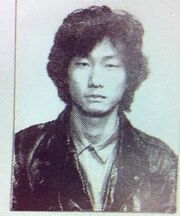
Kojima in 1983.
Born in Setagaya, Tokyo in 1963,[1] Kojima moved to western Japan at the age of three. Kojima has said that early on in his life he often had to deal with death.
When he was little the Kojima family moved to a small city called Shirasaki. Just as quickly, his family soon moved to the Kansai region. Kojima has noted that growing up he was a latchkey kid, often having to watch television and look after himself when he came home from school. Staying at home by himself in isolation still affects him to this day stating, "[whenever] I travel and stay at a hotel I put the TV on as soon as I enter the room, just to deal with the feeling of loneliness."
Initially wanting to be an artist or illustrator, he was often discouraged by societal norms of Japan which favored finding safe and well paying jobs. He was also discouraged because his uncle was also an artist but suffered from financial difficulties.
He eventually started writing short stories and began to send them to Japanese magazines but was never able to get anything published. He cites that his stories were often 400 pages long while most magazines wanted their short stories to be around 100 pages. Eventually he shifted his focus to making films with his friend who had an 8mm camera.
Career
In an interview on G4's TV series, Icons,[4] Kojima describes much of his earlier career and influences for game design. Kojima grew up early in life watching movies with his parents. While studying economics in college, Kojima found himself playing video games during his free time, mainly on the Famicom. Kojima cites Shigeru Miyamoto's Super Mario Bros. (1985) and Yuji Horii's Portopia Serial Murder Case (1983) as his defining influences. In his fourth year in college, Kojima surprised colleagues by announcing his intentions to join the video game industry, despite initially having ambitions of becoming a film director.[5]
1980s
Kojima joined video game publisher Konami's MSX home computer division in 1986 as a designer and planner. Kojima's gameplay ideas were often overlooked initially, and due to his lack of familiarity with programming he was repeatedly snubbed for his failures in his initial years at Konami. At one point, Kojima considered leaving the company, but stuck on.
The first game he worked on was a sequel to Antarctic Adventure, Penguin Adventure, as an assistant director. The first game he actually developed was Lost Warld (sic), a war-themed platform game starring a masked female wrestler, in 1986. However, the game was ultimately cancelled by Kojima's superiors at Konami.
His first released game was Metal Gear. It was released in 1987, to critical success, on the MSX2 home computer. The MSX system was a huge success in Japan, Europe, Brazil and the Soviet Union, but due to its obscurity in the U.S. and some other nations, many people did not play the game until it was ported to the Nintendo Entertainment System, and even then, the game went through numerous changes during the conversion process with which Kojima was not directly involved. The game featured the debut of Solid Snake. Kojima also released the critically acclaimed Snatcher, a graphic adventure game with a cyberpunk setting and Cold War themes, in 1988.
1990s
In 1990, Kojima released Metal Gear 2: Solid Snake for the MSX2 in Japan only. The game was critically acclaimed in Japan for its sophisticated gameplay and intricate storyline, as it introduced many significant changes and additions to the Metal Gear series, most of which were later carried over to Metal Gear Solid. Of particular importance was the significantly improved characterization of the game's cast and the bigger emphasis given to the game's storyline, which was advanced through the use of cutscenes and covered themes regarding the effects of war. Other changes include significant enhancements to the enemy soldiers' behavior and AI, the ability to crawl, and the introduction of the radar, among other improvements. Despite the game's success in Japan, it was never officially released in the West until its inclusion in Metal Gear Solid 3: Subsistence in 2006.
In 1992, Kojima remade Snatcher for the PC under title of Snatcher CD-ROMantic which would then be ported to the Sega CD, the game's only official English version. In 1994 he designed Policenauts, a film noir/sci-fi-themed adventure game set in a space colony often regarded as a "spiritual sequel" to Snatcher. Snatcher and Policenauts were both huge successes in Japan. Kojima regards Policenauts as his "most exhaustive piece of work." He often calls Metal Gear a "blockbuster movie series" while he regards Policenauts as his "independent film."
With the release of Metal Gear Solid in 1998 for the PlayStation, Kojima became an international celebrity among gamers. Metal Gear Solid was the first in the Metal Gear series to use 3D graphics and voice acting, which gave a more cinematic experience to the game. Metal Gear Solid was highly regarded for its well-designed gameplay and for its characters and storyline, which featured themes of nuclear proliferation and genetic engineering and is widely considered to be one of the best PlayStation games.
2000s
In early 2000, Kojima released the first details of the sequel to Metal Gear Solid, Metal Gear Solid 2: Sons of Liberty, for the PlayStation 2. The game's highly detailed graphics, physics, and expanded gameplay quickly made it one of the most highly anticipated games. The game was highly successful and critically acclaimed at release, due to its graphics, gameplay and storyline, which dealt with myriad philosophical themes as specific as memes, censorship, manipulation, patricide, the inherent flaws of democracy and as grandiose as the nature of reality itself. While Metal Gear Solid 2 broke ground with the breadth of its subject matter, the lengthy exposition of these issues, particularly in the bewildering maze of dialogue and plot revelation in the final hours of the game, left a sour taste in the mouths of many gamers. The game also received negative fan reaction due to the unexpected introduction of Raiden, a rookie soldier, the polar opposite of Solid Snake.
Before Metal Gear Solid 2's release, Kojima produced the game and anime franchise Zone of the Enders in 2001 to moderate success. In 2003, he produced Boktai: The Sun Is in Your Hand for the Game Boy Advance. Another team inside Konami also began work on Metal Gear Solid: The Twin Snakes, a Nintendo GameCube remake of Metal Gear Solid with all the gameplay features of Metal Gear Solid 2 and with cutscenes redirected by action/horror film director Ryuhei Kitamura, which was released in 2004.
Afterwards, Kojima designed and released Metal Gear Solid 3: Snake Eater for the PlayStation 2. Unlike the previous games in the series, which took place in the near future and focused on indoor locations, the game is set in a Russian forest area during the year 1964, and involves wilderness survival and camouflaging. Critical response to the game was highly favorable.
At that time Kojima also worked on Boktai's sequel, Boktai 2: Solar Boy Django for the Game Boy Advance, which was released in summer 2004.
Also released was Metal Gear Acid, a new spin on the Metal Gear series, for the PlayStation Portable in 2004 in Japan and 2005 in other countries. Its sequel Metal Gear Acid 2 was released in 2005 in Japan and 2006 in other countries.
Metal Gear Solid: Portable Ops was also released in 2006. It takes places six years after the events of Metal Gear Solid 3. Kojima was the producer and general manager for the game.
Kojima wanted Solid Snake to appear in Super Smash Bros. Melee, but due to development cycle problems Nintendo was unable to add Snake in. When Super Smash Bros. Brawl was announced, series producer Masahiro Sakurai contacted Kojima to work Snake into the game. Kojima also worked on Snake's stage for Super Smash Bros. Brawl.[6]

Kojima makes a cameo appearance in one of Metal Gear Solid 4's opening movies. He's watching from the sidelines.
Kojima co-directed Metal Gear Solid 4: Guns of the Patriots with Shuyo Murata, as well as co-producing and co-writing the game. Kojima also oversaw the entirety of the games production, including the opening movies which were created by Logan, as well as making a cameo appearance in one of them. In addition, he is credited as the "Voice of God" in the game's voice over credits; during the scene in which Psycho Mantis' ghost convulses then disappears, the player can hear Kojima's voice yell, "Silence!", accompanied by an image of Kojima himself via a hidden flashback.
Following Metal Gear Solid 4, Kojima announced three new games in the Metal Gear series at E3 2009. The first game announced was Metal Gear Solid: Rising, a multiplatform game starring Raiden that was supposed to take place between Metal Gear Solid 2 and Metal Gear Solid 4. Rising was later retitled Metal Gear Rising: Revengeance and developed by Platinum Games. It takes place four years after the events of Metal Gear Solid 4. The second game announced, Metal Gear Solid: Peace Walker, is set 10 years after the events of Metal Gear Solid 3 and stars Big Boss. Peace Walker was released in 2010. The final game announced, Metal Gear Arcade, is a coin-op iteration of Metal Gear Online. It was also released in 2010. He was also involved in Castlevania: Lords of Shadow, which was released in 2010. Kojima in an interview with Eurogamer in 2009 also admitted that even he was confused with the timeline of the Metal Gear Solid saga, in regards to the creation of prequels.[7]
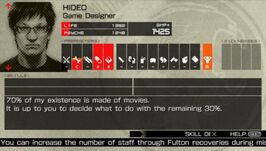
Kojima appears as a recruitable soldier in Metal Gear Solid: Peace Walker.
2010s
On June 20, 2012, Kojima officially announced that Metal Gear Solid V was in development and that it would use the Fox Engine. In a Twitter post made Kojima, he revealed that he became a scholar at the University of Southern California. During a lecture hosted by him, he unveiled a new demo of the Fox Engine depicting a man similar to Big Boss and a Stryker in a jungle environment. Regarding the 25th anniversary, he stated that he'd make an announcement relating to the 25th anniversary and his new project on August 30, 2012.[8]
Kojima appears as a Militaires Sans Frontières informant in Metal Gear Solid V: Ground Zeroes, during the Side Op Intel Operative Rescue, which he voices in both the Japanese and English versions of the game.
Kojima has stated that he suffers from 3D Motion Sickness, which is why he could not add new camera angles to Metal Gear Solid 3.
Last Metal Gear game
Kojima has stated multiple times when the latest Metal Gear game was released that it would be the last in the series.[9] He has stated this after the releases of: Metal Gear Solid, Metal Gear Solid 2: Sons of Liberty, Metal Gear Solid 3: Snake Eater and Metal Gear Solid 4: Guns of the Patriots, saying that Metal Gear Solid 4 "is going to the final one for me."[9] He said that ending the Metal Gear series would give him more freedom to pursue other projects in the future and also stated that Metal Gear Solid 4 would be the final game to feature Solid Snake.[9] However, with the announcement of Metal Gear Rising, Peace Walker, and Metal Gear Solid V, Kojima is once again involved in the Metal Gear series.
Future of Metal Gear
Regarding the Metal Gear series, Kojima stated at the 2009 Tokyo Game Show:
"Solid Snake's storyline has ended with MGS4. But there's still a lot more when it comes to Naked Snake's storyline."
When asked about remaking the original Metal Gear in September 2009, Kojima stated that he was at the time too busy to do it. However, he said that he does not have to be the one to remake it and suggested somebody younger or even a foreign studio unassociated with Kojima Productions could develop it.[10]
He has stated during the development of both comprising parts of Metal Gear Solid V that he intends to follow through with his supposed retirement from the series.[11]
On March 19, 2015, it was reported that due to a fallout between Kojima Productions and Konami, Kojima would most likely leave Konami after The Phantom Pain is released. It was also reported that Kojima Productions was affected by the fallout as well.[12] A day later, Konami and Kojima released a joint statement confirming that development for the game will not be negatively affected by the restructuring within the company.[13] Konami also stated that they will continue to develop more Metal Gear games after The Phanton Pain is released.[13]
Influence from movies
Kojima's love of film is noticeable in his games where he pays homage through his stories and characters.
Examples of influence by films include Solid Snake's codename (named after Snake from Escape from New York)[14] and real name (David Bowman from 2001: A Space Odyssey),[15] Hal "Otacon" Emmerich (HAL 9000 from 2001: A Space Odyssey),[15] Sniper Wolf shooting Meryl Silverburgh in Metal Gear Solid (Full Metal Jacket),[14] Psycho Mantis (inspired from the film The Fury)[14] and the whole stealth concept for the series (The Great Escape).[14] During TGS 2009's unveiling of Peace Walker, he also compared the opening of Peace Walker to Seven Samurai.[16]
Gallery
Metal Gear works
- Metal Gear Solid V: The Phantom Pain (2015) - writer/producer/director
- Metal Gear Solid V: Ground Zeroes (2014) - writer/producer/director/voice and motion capture of Hideo
- Metal Gear Rising: Revengeance (2013) - supervising director
- Metal Gear Solid: Peace Walker (2010) - writer/producer/director
- Metal Gear Acid Mobile (2008)
- Metal Gear Online (2008)
- Metal Gear Solid 4: Guns of the Patriots (2008) - writer/producer/director/voice of god
- Metal Gear Solid Mobile (2008)
- Metal Gear Solid 2: Bande Dessinée (2008) - producer/director
- Metal Gear Solid: Portable Ops Plus (2007) - producer/general manager
- Metal Gear Solid: Portable Ops (2006) - producer/general manager
- Metal Gear Solid: Digital Graphic Novel (2006) - producer/director
- Metal Gear Solid 3: Subsistence (2005) - writer/producer/director
- Metal Gear Acid 2 (2005) - producer
- Metal Gear Acid (2004) - producer
- Metal Gear Solid 3: Snake Eater (2004) - writer/producer/director
- Metal Gear Solid: The Twin Snakes (2004) - writer/producer/original director
- Metal Gear Solid 2: Substance (2002) - writer/producer/director
- The Document of Metal Gear Solid 2 (2002) - producer/director
- Metal Gear Solid 2: Sons of Liberty (2001) - writer/producer/director
- Metal Gear: Ghost Babel (2000) - producer/supervising director
- Metal Gear Solid: VR Missions (1999) - producer/director
- Metal Gear Solid: Integral (1999) - writer/producer/director
- Metal Gear Solid (1998) - writer/producer/director
- Metal Gear 2: Solid Snake (1990) - writer/director ("scenario/game design")
- Metal Gear (1987) - writer/director ("game design")
Movies
- Metal Gear Solid (TBA) - executive producer/writer
Other Works
- Silent Hills (cancelled) - co-director
- Castlevania: Lords of Shadow (2010) - producer
- Lunar Knights (2006) - producer
- Boktai 3: Sabata's Counterattack (2005) - producer
- Boktai 2: Solar Boy Django (2004) - producer
- Boktai: The Sun Is in Your Hand (2003) - producer
- Zone of the Enders: The 2nd Runner (2003) - producer
- Zone of the Enders (2001) - producer
- Policenauts (1994-1996) - writer/director
- Snatcher (1988/1992) - writer/director
- Penguin Adventure (1986) - assistant director
References
- ^ a b IGN: Hideo Kojima Biography. Retrieved on 2008-03-12.
- ^ Mr. Kojima, Konami Videogame Designer Was Selected One Of Ten "Who's Next?" of NEWSWEEK (2002-01-22). Retrieved on 2008-03-31.
- ^ THE NEXT-GEN HOT 100 DEVELOPERS 2008 (2008-02-19). Retrieved on 2014-03-17.
- ^ ICONS: Hideo Kojima - Metal Gear Solid. Retrieved on 2008-03-13.
- ^ Hideo Kojima Interview: Konami's master game designer talks about the Metal Gear series and where games are going. (2003-05-18). Retrieved on 2008-03-12.
- ^ Super Smash Bros. Brawl revealed for Wii, featuring Solid Snake! (2006-05-10). Retrieved on 2008-03-13.
- ^ http://www.eurogamer.net/articles/hideo-kojima-gamescom-2009-interview
- ^ http://www.eurogamer.net/articles/2012-07-11-metal-gear-solid-4-patch-to-add-trophies
- ^ a b c A List Of Times Hideo Kojima Has Said He's Done Making Metal Gear
- ^ Kojima: Maybe A Foreign Studio Should Re-Make Metal Gear. Kotaku. 2009-09-29. Accessed 2009-10-22.
- ^ Kojima Says Metal Gear Solid V: The Phantom Pain Is the Last 'Metal Gear Solid' - IGN
- ^ Kojima Expected to Leave Konami After MGS5, Inside Source Confirms - GameSpot
- ^ a b Notification Regarding “METAL GEAR SOLID V: THE PHANTOM PAIN”
- ^ a b c d Steven Kent. Hideo Kojima: Game Guru, Movie Maniac. Retrieved on 2008-03-13.
- ^ a b The Making of Metal Gear Solid 2: Sons of Liberty DVD packaged with European version of Metal Gear Solid 2: Sons of Liberty
- ^ Kojima talks Peace Walker - GameSpot


